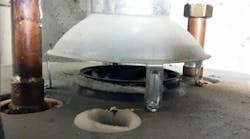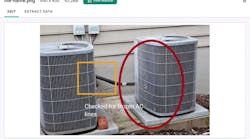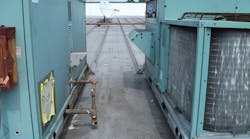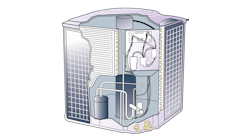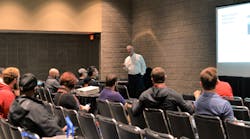In Batman lore, Police Commissioner Gordon shines the “bat signal” into the sky when he needs the help of the Caped Crusader. Multi-location clients across the country are shining a similar “help needed” sign into the sky as they seek reliable maintenance and repair providers for their commercial HVAC systems. Contractors who are savvy enough to respond to the cries for help will find a world of opportunity waiting for them.
Although the headquarters of BOSS Facility Services is in the shadow of Gotham City, we provide service to 35 multi-location clients coast-to-coast, covering roughly 9,000 locations. Whether you call this a “national accounts” business, as some do, or the “multi-location service market,” as we do, the needs and opportunities are the same. There are, however, some important keys to succeeding in this market.
Communicate at All Times
We learned long ago that communication is the hot button for most clients.
In the multi-location market, communication is critical. Your contact is usually a facilities department manager who is responsible for a number of widely scattered sites. If we are professional, proactive communicators, that person doesn't need to sit there and worry, “Is my building being responded to?” We can take that worry out of the equation.
What do you need to communicate? At BOSS Facility Services, we have an automated system that can tell a facilities person as much as he or she wants to know: when a service call is scheduled, when our tech arrives, if any repairs are needed, when a part is ordered, when the job is completed, and so on.
Not everyone wants all this information, so we can customize our system to deliver only the information a particular facilities manager asks for. Some want to be informed about every detail. Others just want to know when a call is completed and if any problems were found. It's entirely up to them. From our point of view, our automated system saves us labor time — we don't need to have someone monitoring every tech and making phone calls or sending emails to facility managers every day.
How you communicate is as important as what you communicate. You must communicate every call, consistently, so clients come to know how you're going to keep them informed. You can't call one day, then send an e-mail the next. Facility managers must understand your method and come to look for it.
You also must communicate promptly. If your tech is going to be late getting to a location, or if a part isn't available and that's going to delay a repair, give the client this information immediately. When things like this happen, the facility manager will receive a call from his or her location, and will be put on the defensive. By communicating proactively, you make a bad situation better.
Understand Your Clients' Needs
Research your clients, and their industries, before your first meeting with them. Different clients have different needs. Banks and other clients in the financial industry, for example, may want a list of employees who are going to be at their properties. At restaurants, you'll likely have to do your work before the stores open, or after they close. Some retailers will not allow you to set up ladders on their sales floors.
Once you've identified a particular industry or type of business you want to work with, understand who they are and find out their specific needs and requirements. They'll be impressed that you took the time to get to know them.
Provide Solutions
Your multi-location clients are like any other client: they need you to provide solutions.
Let's say you receive a “no-cooling” call from a multi-location client late on a Friday afternoon. Your technician finds a unit that needs a new motor. We've seen contractors in this situation say, “We'll get the part and make the repair as soon as we can, but we can't get the part until Monday.” The retailer or restaurant manager is left to languish over the weekend — which is when they likely do most of their business — with a hot facility, and customers walking out. That's not a pretty picture.
You always have to ask, “What can we do to help?” Maybe you could provide fans, or portable cooling units. It may not be ideal, but you must understand that a lot of it is perception. When the store manager sees portable cooling being delivered, they like it. It sure beats, “Sorry, nothing we can do.”
When a client asks, “Can you do anything to help?” answering “no” is not an option.
Provide Additional Services
Clients in the multi-location business are looking for one-stop shopping. They want to make one phone call to one vendor who can take care of most of their issues. I'm not suggesting that every HVAC contractor go into every trade for every client. But you can look for specific opportunities.
Add simple things, such as a handyman services. Look for light fixtures that need a lamp replaced, or a balky door that needs a new hinge. Have your tech at the location call these things in, then ask the client if they would like you to take care of it. It saves the client a trip charge, allows you another sale, and it lets your clients know that you're available to help them in ways they might not have considered.
You can send apprentices and helpers to do these kinds of things, and it opens the door to expand into other services. There are big needs out there.
The answer is always, “Yes we do it, or we can get it done.” At BOSS, we hire local contractors to do whatever is needed. The point is we want the client to call us. It's easier for them, and everything we do makes us that much more valuable to them.
Provide Value-added Services
Be an information resource for your clients. Provide reports. You might be surprised by how many major corporations around the country don't have a way to keep track of their facilities' maintenance needs. Give them a weekly call report, a monthly billing report, and an annual equipment report. Think of what's in your database that you can access at the click of a button. You can become a great resource for clients just by forwarding to them reports that you already have.
Stay in Touch
Stay aware of and in touch with your clients. Know who they are, what changes their industries are going through, and what their financial capabilities may be. Let them know you're there. Get involved in their trade associations and you'll have an insider's perspective on their needs. Always ask what else you can do for them.
To succeed in the multi-location service market, you must have good business sense, proactive communication skills, and a willingness to serve clients' needs no matter what it takes. Look for those “bat signals,” they're shining from coast to coast, calling for help.
Bob Keingstein is the owner of Boss Facility Services, Ronkonkoma, NY. He can be reached at 866/267-7463, × 202, or by e-mail at [email protected]
